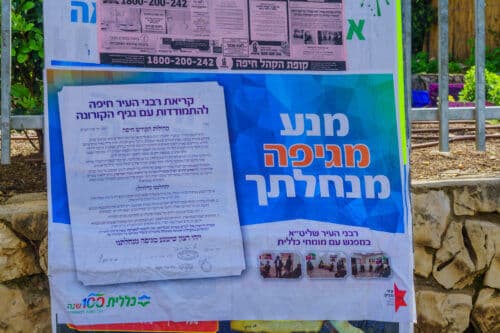"Awareness of the cultural values of therapists and patients from different groups in Israeli society helps not only in improving the efficiency of treatment, but also in reducing the gaps and increasing social solidarity," say the researchers

Researchers from Ben-Gurion University of the Negev have developed a course that helps treatment and assistance teams develop and improve cultural sensitivity for patients from different backgrounds and populations in Israeli society, following the Corona crisis. The goals of the study are to increase awareness of the cultural sensitivity of different populations for the benefit of streamlining treatment and strengthening social cohesion. This is in accordance with the spirit of medical education of the Faculty of Health Sciences - according to which during treatment the psychological and social background of patients must be taken into account, and not be satisfied only with their medical problems. Click here for the student website.
The Corona crisis posed many challenges to Israeli society. In addition to the medical and economic challenges, the crisis also exacerbated the existing gaps between social and cultural groups in Israel, with medical care personnel such as nurses, doctors and paramedics in between. In addition, aid teams such as local authorities, soldiers, police, emergency organizations and volunteers in organizations such as ZAKA and others also participated in the response. All of these were required to provide a professional response to diverse populations that are sometimes unfamiliar to them.
"Emergencies affect the social structure of the entire population," explains Dr. Odia Cohen, head of the master's degree program in emergency medicine and a lecturer in the nursing department, who developed the course together with Dr. Ortal Slobodin from the education department, and Yosef Kula, a paramedic, a research student in medicine Emergency at the School of Public Health and has a master's degree in social work.
"During an epidemic, the situation worsens because the use of professional terms such as isolation and seclusion create alienation. In such a situation it is easier to label groups in society as 'disease spreaders', even though there is no real reason for this. This was the case, for example, at the beginning of the crisis towards people of Chinese origin and later towards ultra-Orthodox or Arab society. Therefore, especially in emergency situations, it is necessary to establish fast relationships of trust between therapist and patient. This is done with the help of developing cultural competence, which is awareness and respect for the cultural values of the therapist and the patient," adds Dr. Cohen.
The team of experts from academia and the field found an interactive and friendly way to provide tools for the care and assistance teams so that they can provide a professional and sensitive response to diverse populations. The course is based on extensive knowledge gained in the field and is well adapted to the current Israeli context and the socio-cultural diversity that exists there. Along with exposure to rich academic knowledge, the course includes recorded interviews with experts in the field, videos and press articles.
The study focuses on three dimensions of cultural competence: the awareness component, which includes alertness to the existence and importance of cultural influences on the health field. The knowledge component, which includes familiarity with the different characteristics of physical and mental health in different cultures. and the skill component, related to the ability to discover cultural competence in practice.
For example, in Lomada, the testimony of a Druze doctor is cited as an example of how a lack of cultural understanding can hinder receiving appropriate medical treatment. When his grandmother was asked by the doctor how she was doing, she answered "Al-hamdulillah". "There are cultures where it is not acceptable to grumble or complain, this does not mean that the patient does not have a problem, explains the doctor.
The friendly study that was launched these days, sits within a website, where a variety of activities will take place to improve the cultural competence of the treatment personnel: a forum and consultation with experts in the field, exposure to testimonies and stories from the field, answers to short questionnaires before and after the study, opinions and more.
In order to test the effectiveness of learning in practice, it is accompanied by academic research. The participants of the study are asked to answer a short questionnaire before and after conducting the study, and the results of the study will help in the development of future intervention programs adapted to a specific target audience. These days the learner is being translated into the Haggai language in order to be able to serve aid teams around the world.
"We believe that exposure to Lomeda will help care and assistance teams to get to know themselves better and the challenges they face in meeting people from different cultures," says Dr. Slobodin. "Beyond improving the efficiency of care and assistance, increasing the cultural competence of care and assistance teams may contribute to reducing social gaps and increasing solidarity."
The development of the study and the execution of the research were conducted within the scientific action force to fight against Corona, established by the president of Ben-Gurion University, Prof. Daniel Haimowitz. As part of the initiative, it was decided to divert research resources to find quick solutions to the various problems that arose as a result of the Corona crisis. In addition, the project was funded by the Ministry of Science and Technology.
More of the topic in Hayadan:
- Genomic research from Uni' Tel Aviv: about 70% of the chains of infection of the corona virus in Israel originate from the USA and the rest from Europe
- Researchers from Tel Aviv University have developed a serological test to detect corona antibodies and will use it to test IDF soldiers
- The dilemma of getting out of the corona crisis - money or life?
